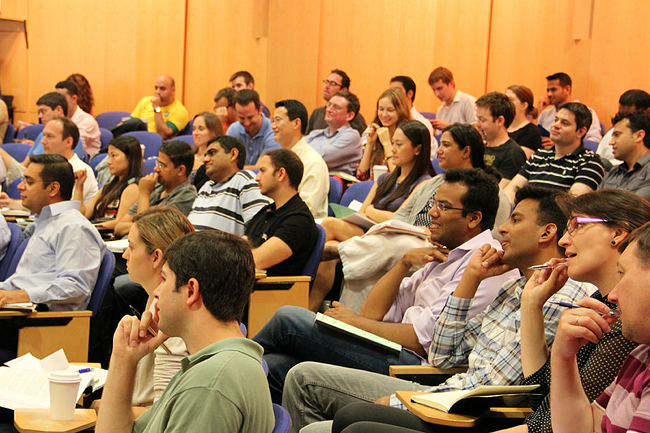P&Q: How do you see the EMBA market changing in the next five to 10 years?
I think that’s a great question. It’s going to be interesting to see. I think for us, we feel really good about the innovations we’ve had over the past five years. We’ve had more change than we’ve ever had. We feel well positioned for the future and listen to the students and continue to innovate and adjust and advance in alignment to what they expect.
Definitely a lot of that is the career management piece and students looking for that value whether it’s career coaching, guidance, or to move up in a company or even switch careers or launch a new venture. And that’s the biggest challenge. You have to be strategic in what you are offering. Elective choice is also important because they all have different goals and ambitions. You want to offer the best and most (elective courses). Our electives are the most robust of our peers because our students want that and we can provide that with our size.
The experiential piece is another thing. They are looking for international experience and electives. So we also have the international global electives taught mostly in Hong Kong, but other places in the world as well depending on the year.
For us, it’s all about quality. The students are investing a lot and are looking to get the most of the experience and are looking for the best quality. That’s what we deliver—the highest quality product and experience.
P&Q: What specifically do students want from the career services office, and is that provided?
It’s everything from resume development and interview skills, how to deal with difficult situations, how to think about what’s right for you, how to access skills and interest, salary negotiations, work/life balance, we cover a broad range of students. It’s about developing career management skills for life.
P&Q: What do you mean by difficult situations?
Whether it be a challenging thing at work with a boss or colleague or negotiating a promotion, members of our career management team are well versed and they offer coaching and counseling.
The other component, not only with career services but also with all courses, is around leadership and building skills around being effective global leaders. We do integrate a lot of leadership in our core classes to complement what our career management group is offering. We really try to bring in speakers to help share their perspectives with the students.
P&Q: Have you seen an influx in EMBA students interested in entrepreneurship?
Definitely. There is definitely increased interest, whether it’s in intrapreneurship or entrepreneurship; we’ve had students with no idea they would be doing that but then they launch businesses after graduating. We offer courses in addition to what the (Eugene) Lang (Entrepreneurship) Program offers.
I think this is because there is such a demand for that kind of thinking in the marketplace; whether you are in a company or startup, there is a huge emphasis on innovation, creativity, and solid, creative problem solving, as well as being able to connect the dots to see into the future and make decisions. And all of those things are part of entrepreneurship in a way.
P&Q: Who or what factors are your program’s primary competitors?
Because of the size of our program, all of our top–tier peers are our competitors. For our EMBA-Americas program, we are drawing from all over the U.S. and North and South America so any local program could be our competitor because they have the option to attend a smaller, local program.
P&Q: If you could make one thing happen in the EMBA marketplace, what would it be?
I’d like to see all schools putting their executive MBA program on par with the MBA, in terms of same degree, same requirements, and same attention. And that has happened in the industry. It has changed dramatically in the past 20 years but not a sudden change. It’s been a continuation of really making EMBA programs even stronger and completely on par with full-time programs. I think it is a part of the future of EMBA education. You can do the EMBA while you are still working and have experience and you can take it immediately back to the workplace. Giving people the opportunity to learn from professors and apply it directly to work is something really powerful EMBAs can offer.
DON’T MISS: HAAS & COLUMBIA GET AN EMBA DIVORCE






Questions about this article? Email us or leave a comment below.